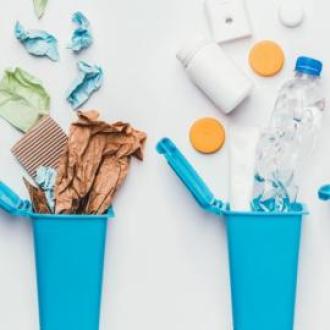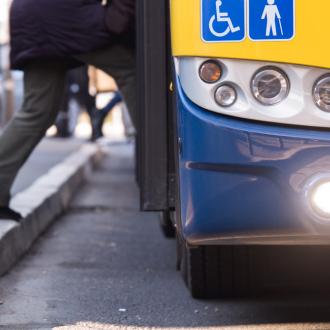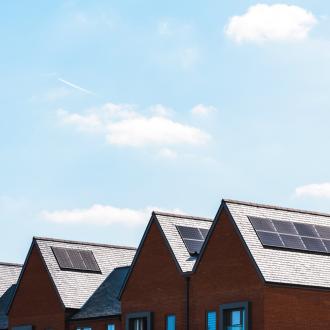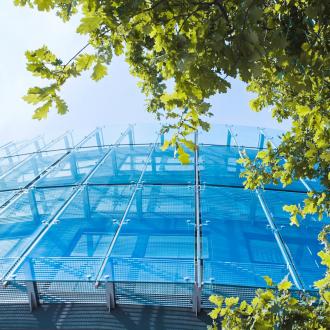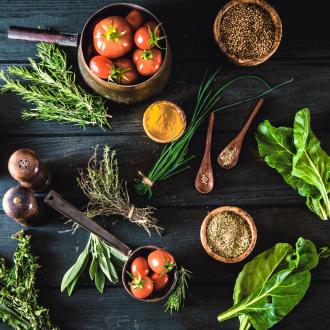Recycling food waste
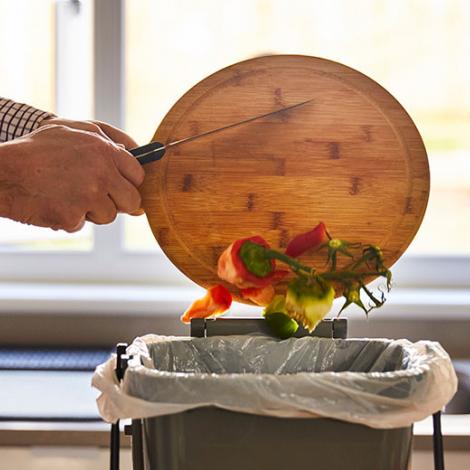
When we waste food, we also waste all the energy that went into producing, transporting, storing and cooking it. Some food waste is inevitable, but recycling or composting is better for the environment than throwing it in the bin.
Buy only what you need and eat what you buy
Scottish households throw away around 600,000 tonnes of food waste every year – that’s the weight of about 2,000 Kelpies statues! Avoidable food and drink waste costs Scottish households £1.1 billion in unnecessary purchases each year. By reducing food waste, your family could save up to £440 per year.
Rather than throwing unavoidable food waste into the bin, it’s much better to recycle it. Food waste sent to landfill isn’t exposed to enough oxygen to allow it to naturally biodegrade so it rots and decays, releasing the destructive greenhouse gas methane into the air, which is much more harmful to the planet than carbon dioxide.
Because of this, food waste is one of the main factors behind rising greenhouse gas levels and a significant contributor to climate change.
The best thing we can do is not waste food at all but sometimes it’s unavoidable. Things like banana peels, eggshells, apple cores, tea bags or out-of-date ingredients don’t make for a tasty meal, which is why it’s important to recycle or compost and avoid sending more household waste to landfills.
600,000
tonnes of food waste is thrown away by Scottish households every year
What happens to recycled food waste?
When food waste is recycled, the gases are captured and converted into green energy or biofuel that can power our homes. This type of renewable energy captures the natural gases from old food and can be used for electricity and home heating. For example, your weekly food waste could power nearly two cycles of your washing machine.
Not all food waste is treated in the same way – for example, compostable waste like biodegradable coffee cups and other sustainable packaging is separated from food, shredded and stored until it’s ready to use as organic compost. Through this process, recycled food waste is converted into valuable natural fertilisers or soil improvers that can be used for farming.
So even if you don’t think you throw away a lot of food, remember that every bit of food waste that’s recycled stops methane from entering the atmosphere. It all adds up and will help Scotland meet its Net Zero emissions target.
There are lots of quick and simple things you can do to reduce and recycle your food waste, but shopping smartly will also reduce the overall amount of food you throw away. Start by making lists, checking what you already have in the cupboards at home, buying smaller quantities and fewer fresh ingredients more often to reduce overall food waste.
Find your local council recycling facility
In Scotland, 80% of households have a separate food waste collection but only 55% make use of this service. Your local council should provide you with a food waste caddy, and to find out what food waste recycling services are available near where you live, contact your local council and they’ll help you.
Even if food waste recycling facilities aren’t available in your local area, you can still recycle your food waste at home in a composting bin or compost heap. You can make homemade compost from food waste even if you live in a flat without a garden; start with a container that has a tight lid, and find a place for it under the sink or in an out-of-the-way corner in your kitchen.
80%
of households in Scotland now have access to a food waste collection service
How to recycle food waste
- What can be recycled?
Any and all uneaten foods including dairy, meat and bones, fruit, vegetables and peelings, rice and pasta, cakes and biscuits, eggs and eggshells, fish bones and shells, pet foods, tea bags and coffee grounds can be recycled.
Follow these simple steps to make the most out of your food waste recycling service:
- Line your kitchen caddy – your council might recommend that you line your food waste caddy with a liner or newspaper. Only use liners that are recommended by your council as some may not break down in the composting process.
- Empty all your food waste into the caddy, taking care to remove any packaging. This is very important as packaging causes contamination which means your food waste can’t be recycled.
- When your caddy is full, transfer its contents into your kerbside or outdoor food waste bin, ready to be collected and taken for recycling.
- Keep your caddy handy – you could store it next to your other kitchen bins, under the sink or on your work surface – wherever is the most convenient and practical for you to recycle all your food waste easily and quickly.
- What can’t be recycled?
Anything that isn’t food, packaging of any kind, liquids such as milk, oils, and liquid fats can’t be recycled. Make sure you separate food waste from any packaging including plastic wrapping and glass jars first – this avoids contamination. If the food waste is contaminated, it can’t be recycled.
Your Guides
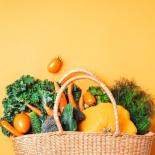
Food planning tips to reduce waste and save money
Planning and shopping smarter can help you to reduce the amount of food you waste.
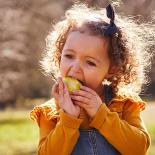
Eating healthy and sustainable food
Producing food is big business. To grow, make, transport, store and cook our food is an energy intensive process and unsurprisingly, one which generates greenhouse gas emissions that contribute to climate change.
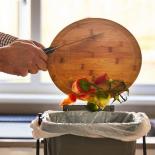
Recycling food waste
The best thing we can do is not waste food at all. When we waste food, we also waste the energy and resources that went into producing, transporting, storing and cooking it.
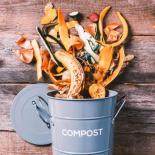
How to compost at home
If your local authority doesn't offer a food waste recycling service, you can recycle your food waste in a composting bin or a compost heap.
Take action starting now
To achieve net zero by 2045, we must take action now. Start here to find ways that you can make changes in your life at home and on the go.
